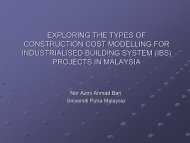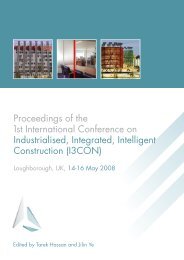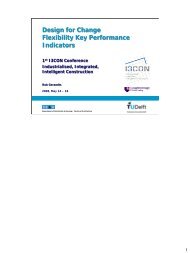Industrialised, Integrated, Intelligent sustainable Construction - I3con
Industrialised, Integrated, Intelligent sustainable Construction - I3con
Industrialised, Integrated, Intelligent sustainable Construction - I3con
You also want an ePaper? Increase the reach of your titles
YUMPU automatically turns print PDFs into web optimized ePapers that Google loves.
SUSTAINABLE CONSTRUCTION HANDBOOK 2<br />
Deciding on a final design before fully assessing client and user needs and problems may prove very<br />
costly (O’Reilly 1987).<br />
Common problems of meeting end-user needs<br />
If design can have such an impact on functionality and satisfaction, why is the design phase of<br />
construction not becoming more advanced to meet end-user needs? Designers have two clients; clients<br />
who pay for what is built and clients who will eventually use it. The user client has little choice or<br />
control which presents designers with a problem. When users are unknown, designers tend to make<br />
assumptions as if they were users (Blyth and Worthington 2001). Therefore, this lack of knowledge<br />
regarding the eventual use of a building can severely reduce the effectiveness of the design by the<br />
architects. Clients can often find that they are expected to have far greater knowledge and<br />
understanding of construction and the implications of what will be built, than they actually do. The<br />
clients’ expertise is in their business and not within delivering buildings; they rely on the designers<br />
and contractors to provide a delivery service that will support business needs (Blyth and Worthington<br />
2001).<br />
Facilities Management (FM)<br />
The FM profession is a relatively new phenomenon yet potentially can bring a number of benefits<br />
within the UK construction industry. A definition of FM is required to fully understand these benefits,<br />
especially at the briefing and design phases of construction. Their impact within the industry will be<br />
considered after the initial introductory information has been presented. The ideas of Sustainability<br />
and FM will be discussed in Chapter Four. FM has seen rapid growth during 1990. There is an<br />
increasing tendency for organisations to contract out non-core business activities in order to provide<br />
the best service at the lowest cost (Shah 2007, Barrett and Baldry 2003). There remains a number of<br />
differing opinions of what FM actually is although the most widely accepted concept is provided by<br />
the BIFM (ratified by BSI British Standards):<br />
“Facilities Management is the integration of processes within an organisation to maintain and develop<br />
the agreed services which support and improve the effectiveness of its primary activities” (BIFM<br />
2008).<br />
The foundation of FM is based upon integration of the planning and management of a range of hard<br />
services (e.g. building fabric) and soft services (e.g. catering, cleaning and security) to achieve quality<br />
and economies of scale. “FM is concerned with managing not just the building structure but the<br />
facilities that are also provided within the structure in order to improve the overall value for money<br />
for the client” (BIFM 2008).<br />
Shah (2007) highlights the main FM service categories which are as follows:<br />
• Cleaning<br />
• Data Management and IT<br />
• Building Management and Maintenance<br />
• Ground Management and Maintenance<br />
• Security<br />
• Procurement<br />
• Project Management<br />
• Health and Safety<br />
These categories show the diverse range of services FM can be involved in and the possible efficiency<br />
benefits regarding the effective management of each. As an example, building maintenance can affect<br />
the longevity of the components within a buildings fabric of services. Inadequate maintenance could<br />
result in a costly refurbishments/replacement and reduced employee well-being. These vast<br />
competencies of what FM are involved in reflects on the lack of widely accepted definition of the<br />
profession.<br />
218






